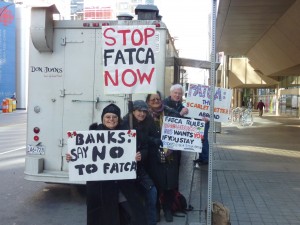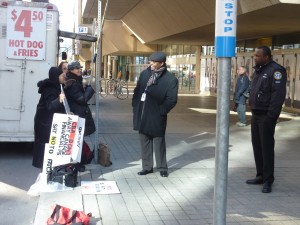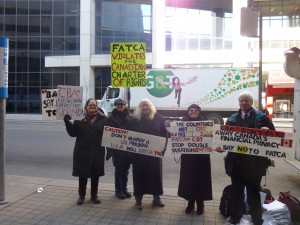photo from yesterday, day 1 of protest
PROTEST EVENING POSTMORTEM:
I know that this small protest did reach the FIsters attending the conference and put them on notice–because most refused to look us in the eye.
This protest happened because of the dedication of on-site protesters including Atticus, Marie, Northernstar, Peter, Tricia, and WhiteKat, those (including Blaze and James Jatras) who helped in preparation of the letter to the Canadian Bankers Association that was critical to the protest, and because of the others I am not certain that I can mention.
Amazing people, all.
On-site coverage from IRSCompliantForever :
15.54. A last goodbye from all of us to the banksters.
15:03. Banker from small bank who hates FATCA just signed petition.
14:24. AttIcus just explained FATCA to passerby. Response was “Well, the banks need a little (words deleted).”
14:14. Banksters we meet all express sympathy but insist that there is no way to prevent FATCA. So many passerbys wondering about this FATCA word.
13:18. Fellow from one of the major banks visited with us had a friendly chat and accepted the CBA letter. He asked that we not disclose the name of his bank. Banksters are also taking pictures of us.
12.55. Another passerby came up to us expressing concern that her daughter has a Green Card.
Reports and photos of earlier today and yesterday after the jump
12:53. A passerby just came up to us expressing concern that she was born to a US parent and asked whether FATCA applied. Atticus explained and the woman thanked us for being here.
11:23. Unexpectedly another protester arrived with signs. Someone we all know.
11:13. Police have arrived again.
10:51. Nice sunny day. One bankster inside gave us the thumbs up. We had a nice chat with two reps of a major FI who accepted the CBA letter.
***
Day 1 of Protest – Yesterday, 13 November
13:40. Stuck on a narrow curb.
13:07. New development. Head of security informed us that we had to move to the curb in which we must remain 18 inches from the street. I called the police to resolve. Three police officers came and tried to intervene with security, but security refused as walkway is technically on private property. Want to emphasize that police tried their very best to help us. We will try not to tip over on curb. Lots of interest from passerbys. Morale very high.
12:50
12:46
12:13. Above is a photo of four Brocker/Sandboxers taken by a sympathetic passerby. Note that the person holding the “Do not marry an American” sign is a guest Brocker who is a kindly non-US spouse of a US person. She strongly supports the message of the sign and wants to be known as @LauraSecord. Small group but morale is high.
11:09. Met a fellow working for a bank. He says FATCA is painful.
11:02. Tricia, Marie, NorthernStar and IRSCompliantForever just spoke to a very friendly and receptive journalist who will include mention of our protest in an article He also said that this is the first FATCA protest he is aware of. We cannot mention name of journalist. We are pointing signs at the conference room. Doors are closed now so that banksters cannot see us.
09:37. Peter is standing immediately in front of the conference meeting room. We can see them and they can see us. But we cannot enter.
07:33. Peter and I are on site. We were told us that we would be arrested if we entered building. Tried to leave CBA letters but conference organizer refused and noted that our comments on IBS about CBA were inflammatory.
***
The conference is “Canadian Institute’s 19th Annual REGULATORY COMPLIANCE for Financial Institutions” at the North Building of the Metro Convention Centre in Toronto which has been brought to our attention through the diligence of @Tricia. http://www.regulatorycomplianceforfis.com/













Pingback: Nov. 18 @TorontoCentre All #TorCen Candidates #FATCA debate referenced in Caymans | Toronto Centre Debates - All candidates debate
Pingback: This Week’s News–Lots | Maple Sandbox
@nervousinvestor and others
I do not believe that I make widely exaggerated observations at all.
All Canadian banks have very substantial exposure to US assets that include both loans to US-based borrowers but also all loans denominated in US Dollars to any borrower in the world (for example in the trading or natural resources industries). If the banks became subject to withholding, 30% of these assets would be sequestered.
You may object that banks could circumvent this problem by simply ceasing to invest in US assets, but FATCA has complicated provisions (the ‘pass-through’ clauses) that make this ineffective. Under the pass-through provisions, any bank worldwide that agrees to comply with FATCA must withhold 30% from any payment made to a non-compliant bank even if the latter has no US presence or investment. This means that a Canadian non-compliant bank would effectively suffer a withholding not only on its US investments, but also on any asset held through a correspondent bank, or depositary/custody institutions. Since all major international financial centers are introducing FATCA (the US obviously, the UK, Japan, Germany, France, Switzerland, etc.) this means that a non-compliant Canadian bank would not only excluded from the US market, but from the global banking and financial markets.
Banks are extremely leveraged, typically with capital representing no more than 4-5% of their total assets. So a withholding of 30% on all or a very substantial portion of their assets would be truly catastrophical for a bank’s solvency.
In fact, a non-compliant bank would likely not be able to survive even if the US did not immediately enforce the withholding regime, just because of the increased risk associated with the threat of withholding. Creditors would refuse to advance funding (or demand a large risk premium), clients would withdraw their deposits, counterparties would refuse to take settlement risk, and rating agencies would immediately downgrade all debt. Banks are confidence tricks and they collapse very quickly one confidence evaporates.
I may be missing something in which case I would be happy if someone could correct me. But I am fairly confident of my understanding of this law.
“Banks are confidence tricks and they collapse very quickly one confidence evaporates.”
I believe this to be true, but when fellow Canadians begin being turned to grist through the US tax compliance mill, won’t this effect confidence in Canadian financial institutions?
@bubblebustin
This is an excellent question. I would assume that the number of customers/depositors affected by FATCA is relatively small in relation to Canadian banks’ total customers, but this is definitely something that would worth looking into.
@J.E. Gutierrez
By your estimates, how profound of an effect would causing panic in the lives of 3% of Canada’s population, PLUS their families have on the general population’s confidence in Canadian banks?
@bubblebustin
I really don’t know, but I would assume that it is comparable to a couple of percentage points increase in unemployment. It is certainly not great for banks, and can severely affect the credit quality of their consumer loans business. However it is nowhere near significant enough to cause great systemic risk.
Again, this is not a scientific analysis, and of course I would appreciate others’ insights.
@J.E. Gutierrez
So those of us adversely effected by FATCA aren’t enough to cause a systemic risk to banks? We’ll see about that.
@J.E. Gutierrez
You are saying the banks will be like the people in Omelas? They put all APs in the same situation as the child in the basement?
@bubblebustin
I have tried to answer your questions using some rudimentary, but in my opinion entirely appropriate assumptions.
I would be interested to hear your own thoughts and especially what other computations or assumptions you would use to calculate the impact.
@northernstar
I sincerely wish I understood what you are referring to, but I don’t. Sorry.
@JEG
I have just read yours of 9:18 last night. Thank you. I of course do not agree with you for the moment but will read the post again later today.
In the meantime I and others suggest that if Canada says NO and goes further to build a coalition of countries world wide which also say NO including the BRICS and a multitude of smaller countries then the US will be isolated. I do not see the effect on Canadian Banks’ portfolio of US $ denominated loans where those loans have been made to worldwide entities (for example the country of Jamaica for one) if one simply shuns using a New York clearing house … then end of story in my present view … in addition most international loans and bonds that I have seen require indemnification from the borrowers re any withholding taxes imposed during the course of the loan ….do explain.
Our principle point is that this matter is severe and is an attempt by ONE (1) country to destroy the Sovereignty of every country world wide. The matter should be before the WTO and the United Nations as an act of financial war and that in order to bring it to an end before it starts the US should be shunned by the entire world and shamed …. and not kow towed to. I think that many on this board believe that in that situation the US will back off and repeal its act of financial terrorism. Many believe that the US is at bottom a decent country on balance with some very good people in the main – this FATCA thing and its ilk are not representative of the wishes of the American people … yet they have been kept ignorant of what is being done in their name. The world wide banks need to spend on a massive advertising campaign to inform a) the Governments of the world and their people what is at stake and b) the US people what is going on … before spending billions on abject surrender – that is what politics is all about …. go over the heads of the dictators and go to the mass of the people.
@JE Gutierrez
I think most, if not all, of the leverage the US has on foreign governments and their banks is based on the US dollar being recognised as the world’s reserve currency.
How much longer will the dollar be recognised as the world’s reserve currency?
Will FATCA somehow help the US dollar maintain its position? Or will it ultimately contribute to its demise?
@JEG
If I were a bank without branches in the US (FATCA compliant or non-FATCA compliant) you can bet your ass that I would immediately begin reducing my exposure to US investments and US dollar transactions. I would reduce it over time until my exposure is zero.
The writing is on the wall for total capital controls on anything and everything connected with the US.
@nervousinvestor
You make an excellent point regarding the gross-up provisions in certain loan agreements and bond indentures. I have only limited knowledge in this area, but my understanding is that these arrangements do not apply in situations where a lender fails to take steps or actions that would render the withholding inapplicable. In this case a borrower could argue (and a US court would in all likelihood accept) that the withholding is caused by the lender’s failure to comply with a US law and that as a result the borrower is relieved of its obligation to provide indemnification.
Do you have better information on this topic that you could share?
The point about using a non-US bank to clear payments is in my opinion mis-guided. The ‘pass-through’ clause in FATCA were specifically designed with the objective of preventing this, and from my reading on the topic, it seems water-tight.
I do not believe that the idea of petitioning the WTO has much merit. The WTO is not chartered to arbitrate on tax-related disputes, and the current agreements do not cover trade in financial services to any large extent. I do not know much about the UN’s authority on either matters. Maybe somebody else does.
@FromTheWilderness
From my understanding of the workings of the law, the ‘pass-through’ clauses would make the strategy of reducing US direct exposure to zero would be almost pointless.
I agree with J.E. Gutierrez on one point he made earlier: this is an inter governmental issue. Given the fact that the banks would violate their own countries laws if they agree to that. They should let the government negotiate and not spend a penny on compliance until something has been decided. They should make their point to the Canadian government that the 30% withholding would be devastating, which they had, then let the 2 governments handle that. If they want to anticipate and get prepared, they should prepare their systems to something that make sense: automatic reporting of banking info of non residents. That would be the rationale thing to do. Why spend money on something that might not become law?
The banks must feel it’s in their best interest to keep a lid on the FATCA crisis, after all, who knows what will happen in the panic when US persons, their families and business partners around the world learn that they are the target of an extortionate witch hunt?
The fact is, J.E. Gutierrez, one cannot accurately calculate the impact the FATCA crisis will have on the world, because it involves trying to factor in the messy little variables that flesh and blood people present. Like freedom of choice, the pursuit of liberty and how far people will go to fight their oppressors. History will back me up on how strong these things are in the the hearts of men. It won’t be today, it may not be tomorrow, but sure as the sun will rise, the chickens will come home to roost on any nation or entity that underestimates the power of this.
J.E. Gutierrez,
US collateral damage, in whatever form it rears its ugly head, is acceptable policy?
@calgary411
Definitely NOT! And I hope that I never gave that impression.
The only purpose of my intervention here was to point out that Canadian banks are a poor target for this type of actions, and that in fact their actions to date have been in line with what should be expected from them as fiduciaries of their stakeholders’ interests.
The real targets are the Canadian government, and ultimately the US Congress.
J.E.,
My questions and efforts have been addressed to my Canadian government representatives. The US Congress cares nothing of my family’s situation.
I have officially renounced US citizenship (decades after actually having been warned in 1975 that I would be relinquishing my US citizenship by taking Canadian citizenship). My adult son (and surely many others like him!), born in Canada, raised in Canada, never registered with the US, never lived in the US, never had any benefit from the US, needs protection from his Canadian government by their not allowing our Canadian bank to close accounts held for him. Unless he is protected by Canada and does not have accounts closed by a Canadian bank (due to extra-territorial foreign law being allowed in this country), he is discriminated against by nationality in Canada by both his government and his bank (nationality that he had no choice in and cannot get rid of with any amount of $$ paid to a US tax lawyer) and thus is a second-class Canadian, without the rights of any other Canadian, no matter what their ‘national’ origin. The US Department of State states my son (and others like him) cannot renounce his ‘supposed’ US citizenship (that I am told by a Washington, DC immigration/nationality lawyer he automatically obtained from the moment he was born) because of his lack of ‘mental capacity’ and that a parent, a guardian or a trustee does not have the right to renounce on his behalf, even with a court order!
Families with similar situations need a voice and need protection from their Canadian banks and from their Canadian government.
Blaze’s comment at Maple Sandbox is right on!
Blaze on November 15, 2013 at 6:44 pm said:
@ Calgary411
THANK YOU!
Not sure of his position, but Mr. Gutierrez should be speaking with all of the leaders of the Canadian banks, so as to establish completely independent banking subsidiaries which deal specifically with financial Products excluding US Products.
That subsidiary/company will incur none of the compliance COSTs, as there are no threats of 30% withholding. These banks should be shielded from any discussion of any IGA.
The existing bank can be streamlined so as to use strictly US Products. This subsidiary/division/independent organization is a loser—its business is loaded with compliance costs and ever-shrinking demand. This division will live out its own pre-destined fate.
The independent new divisions are growth organizations—dealing in dynamic financial Products from 189 different countries. These offer the best potential for the future.
Think of your stockholders. Do what it is that will maximize profits.
@ Blaze
THANK YOU for sending the letters to Schoom.
Mark Twain has a very practical solution (doable too) and I hope such financial institutions are created and soon. It would be wonderful to have the option of dealing with a bank or credit union guaranteed to have no connection whatsoever to the U.S.A. and therefore immune from the 30% threat. It would be the beginning of a form of ethical banking since any investment with a U.S. taint is, in my mind, unethical. I view the U.S.A. as a mafiosa-like nation with a monster military and as having lost all moral standing it might once have had. I’m certain U.S. emancipated banking would appeal to more people other than U.S. deemed recalcitrants too. It would appeal to people wanting to send the U.S.A. the message that they do not support U.S. hegemony, either political or economic. The U.S.A. seeks to gobble up the whole globe while keeping its owned people in a 2.3 billion acre prison. The world shunning the U.S.A. is my new dream for humanity. The U.S.A. releasing its prisoners is my new dream for American sanity.